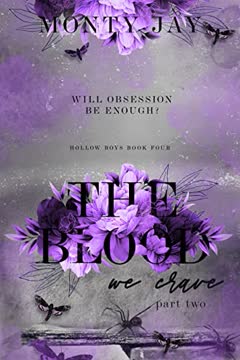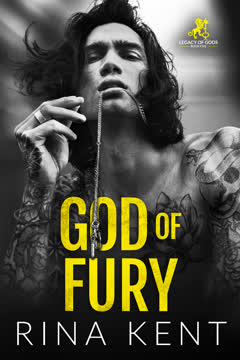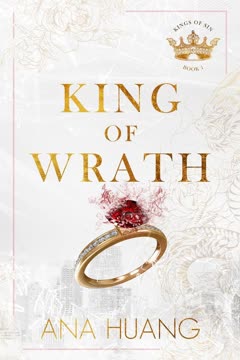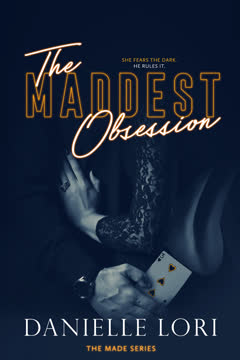Plot Summary
Smoke, Fate, and Loss
Raphael Visconti, reeling from the sudden deaths of both parents, seeks answers in a Vegas fortune-teller's wagon. The old gypsy's reading offers him a choice between two destinies: the King of Diamonds (power, business) or the King of Hearts (love, family). Skeptical but desperate, Raphael chooses the King of Diamonds, sealing his fate as a man of ambition. Yet, the gypsy warns of a doom card—the Queen of Hearts, a red-haired woman who could bring him to his knees. Raphael, hardened by loss and the weight of family legacy, leaves the wagon with a sense of foreboding, his path set but his heart unsettled. The shadow of fate lingers, promising that luck and love are never simple in the world of the Viscontis.
Penny's Return to Devil's Dip
Penny Price, broke and on the run from Atlantic City after a disastrous con, returns to her childhood home of Devil's Dip. The town is both familiar and alien, its glitzy cousin Devil's Cove a reminder of everything she's lost and the temptations she can't resist. Penny's resolve to go straight is tested immediately—her skills as a grifter are both her curse and her only means of survival. She steals a dress, evades security, and stumbles into a new bar, Blue's Den, where fate and danger await. The ghosts of her parents' violent deaths and her own history of hustling weigh heavily, but Penny is determined to start over, even as the past nips at her heels.
The Mark and the Grifter
Penny targets Raphael at the bar, not realizing he's a Visconti—a man whose name is synonymous with power and danger on the Coast. Their banter is sharp, laced with mutual disdain and reluctant fascination. Penny's attempt to con Raphael out of his expensive watch turns into a high-stakes wager, and she wins, but not without drawing his attention—and his ire. The chemistry between them is electric, but beneath the surface, both are playing for survival. Raphael's control is tested by Penny's audacity, while Penny is both thrilled and unnerved by the man she's marked as her last grift. Their encounter sets off a chain reaction neither can control.
Games of Luck and Power
Raphael's world is one of calculated risks and inherited violence. With his brothers scattered and the family empire in flux, he clings to the logic of odds and the illusion of control. Yet, the gypsy's prophecy and Penny's disruptive presence gnaw at his certainty. Penny, meanwhile, is drawn deeper into the Visconti orbit, her luck both a shield and a curse. The Coast is a chessboard, and every move—every con, every flirtation—carries consequences. As Raphael and Penny circle each other, their games blur the line between business and desire, setting the stage for a collision of ambition, vulnerability, and fate.
The Visconti Brothers' Rift
The deaths of the Visconti parents have left a power vacuum. Angelo, the eldest, refuses to return, shattering the expected order. Raphael is left to navigate the family's criminal legacy alone, while Gabe, the youngest, is a wild card. The brothers' relationships are strained by grief, ambition, and old wounds. Penny's reappearance in Devil's Dip is a catalyst, stirring memories and rivalries. The Visconti name is both shield and target, and as the brothers drift apart, enemies circle. The family's future—and Penny's place in it—hangs in the balance, threatened by both internal discord and external threats.
Penny's Last Grift
Penny's vow to go straight is tested by hunger and circumstance. She targets Raphael for one last con, winning his watch in a clever game. But victory is bittersweet—her triumph draws the attention of the most dangerous man on the Coast. Raphael's reaction is not what she expects; instead of retribution, he offers her a job, pulling her deeper into his world. The lines between mark and grifter, predator and prey, begin to blur. Penny's luck is both her salvation and her undoing, and as she navigates the treacherous waters of the Visconti empire, she realizes that some games can't be won without losing something vital.
Dangerous Wagers
The tension between Raphael and Penny intensifies as their games become more personal—and more perilous. Each encounter is a test of wills, a dance of seduction and suspicion. Raphael's need for control clashes with Penny's defiance, and their mutual attraction simmers beneath every exchange. The Coast is a world of high stakes, where every bet has consequences. As Penny is drawn into the Visconti's orbit—working at his casino, navigating the politics of his family—she discovers that survival means more than just luck. It means knowing when to fold, and when to risk everything.
The Queen of Hearts
The gypsy's warning haunts Raphael: the Queen of Hearts—a red-haired woman—will be his downfall. As Penny's presence in his life grows, so does his obsession with her. She is both temptation and threat, a living embodiment of the fate he tried to outwit. Penny, for her part, is both drawn to and wary of Raphael's darkness. Their connection is undeniable, but it is also dangerous. The prophecy becomes a self-fulfilling spiral, as Raphael's attempts to control his destiny only tighten the noose. Love and destruction are two sides of the same card, and the game is far from over.
Sins and Confessions
Penny's guilt over her parents' deaths and her own sins drives her to the Sinners Anonymous hotline—a confessional for the damned. Raphael, too, is haunted by choices and losses, his need for control masking a deep vulnerability. Their confessions—spoken and unspoken—bind them together in a web of secrets and shame. The Coast is a place where everyone has something to hide, and the price of survival is silence. Yet, in each other, Penny and Raphael find a mirror for their own brokenness. The line between sinner and saint blurs, and the search for redemption becomes a shared journey.
The Wedding and the War
Angelo's wedding to Rory is both a celebration and a powder keg. The Visconti family gathers, old alliances and rivalries simmering beneath the surface. Penny, now entangled with the family, witnesses the spectacle—and the danger—of loving a Visconti. The wedding is a brief respite, a glimpse of happiness in a world ruled by violence and betrayal. But as the night unfolds, old wounds are reopened, and new enemies make their move. The war for control of the Coast is reignited, and Penny and Raphael are caught in the crossfire, their fates more entwined than ever.
The Port in Flames
The fragile peace of the Coast is shattered when the port is bombed, plunging the Viscontis into chaos. Penny is caught in the blast, her luck tested to its limits. The attack is both a declaration of war and a personal reckoning—old enemies resurface, and the cost of survival grows steeper. Raphael's world is upended, his control slipping as the prophecy of the Queen of Hearts looms ever larger. The explosion is a turning point, forcing both Penny and Raphael to confront the reality that luck, love, and power are all fleeting—and that the past can never truly be outrun.
New Beginnings, Old Shadows
In the aftermath of the bombing, Penny and Raphael are forced to reckon with their choices. Penny's brush with death brings old traumas to the surface, while Raphael's grip on his empire grows more tenuous. The Coast is a place where the past is never buried, and every new beginning is haunted by old shadows. As Penny tries to rebuild her life, she is drawn deeper into the Visconti's world, her luck both a blessing and a curse. Raphael, meanwhile, must decide whether to cling to the illusion of control or risk everything for a chance at something real.
The Casino's Temptation
Penny's new job at Raphael's casino is both a lifeline and a trap. The world of high-stakes gambling is seductive, offering the illusion of control and the thrill of risk. Penny's skills as a grifter are both her greatest asset and her greatest liability, drawing the attention of friends and enemies alike. Raphael's presence is a constant temptation, his power both intoxicating and terrifying. The casino is a microcosm of the Coast itself—a place where luck, skill, and ruthlessness determine who rises and who falls. For Penny, the line between survival and self-destruction grows ever thinner.
The Gentleman's Mask
Raphael's reputation as a gentleman is both armor and weapon. To the world, he is suave, controlled, untouchable. But with Penny, the mask slips, revealing the violence and vulnerability beneath. Their relationship is a battle of facades, each testing the other's limits. Penny is both drawn to and repelled by Raphael's darkness, while Raphael is both obsessed with and threatened by Penny's unpredictability. The games they play are as much about power as they are about desire, and the stakes are nothing less than their souls.
The Game Escalates
The tension between Penny and Raphael reaches a breaking point as their games become more intimate—and more perilous. Each encounter is a test, a wager with consequences neither can fully anticipate. The Coast is a world where love and violence are intertwined, and every touch carries the risk of betrayal. As secrets are revealed and boundaries are crossed, Penny and Raphael are forced to confront the reality that their connection is both their greatest strength and their greatest weakness. The game has changed, and there is no going back.
Secrets, Threats, and Sins
The past catches up with Penny in the form of Martin O'Hare, the man she wronged in Atlantic City. Raphael's own secrets—his violence, his superstitions, his fear of the Queen of Hearts—come to the fore. The Sinners Anonymous hotline becomes a confessional for both, a place where sins are spoken and absolution is sought. But in a world where survival depends on silence, the truth is a dangerous currency. As threats close in and old enemies resurface, Penny and Raphael must decide whether to trust each other—or risk losing everything.
The Cost of Survival
The war for control of the Coast escalates, drawing Penny and Raphael into its deadly orbit. Betrayals are revealed, alliances tested, and the cost of survival grows ever steeper. Raphael's violence is no longer theoretical—he kills to protect Penny, crossing a line he can never uncross. Penny, for her part, is forced to confront the reality that love and luck are not enough to keep her safe. The world of the Viscontis is one of blood and sacrifice, and the only way out is through. Together, they must decide what they are willing to risk—and what they are willing to lose.
Descent and Reckoning
As the story hurtles toward its climax, Penny and Raphael are forced to confront the consequences of their choices. The games they have played—against each other, against fate, against the world—have left them both scarred and transformed. The prophecy of the Queen of Hearts is fulfilled, but not in the way either expected. In the end, survival is not about luck or power, but about the willingness to face the truth—and to fight for something worth living for. The descent is complete, but the reckoning has only just begun.
Characters
Raphael Visconti
Raphael is the middle Visconti brother, a man shaped by loss, legacy, and the relentless pursuit of power. Trained for leadership, he is both ruthless and calculating, hiding vulnerability behind a mask of charm and logic. The gypsy's prophecy haunts him, and his obsession with control is both his strength and his undoing. Raphael's relationship with Penny is a crucible—she is both temptation and threat, the Queen of Hearts who could bring him to his knees. His journey is one of reckoning: with his family, his past, and the possibility that love, not power, is the true risk.
Penny Price
Penny is a woman forged in trauma and sharpened by necessity. Orphaned by violence, she learned to survive through wit, luck, and a willingness to bend the rules. Her return to Devil's Dip is both a flight from danger and a search for belonging. Penny's skills as a con artist are both her shield and her prison, and her vow to go straight is constantly tested by circumstance and temptation. Her connection with Raphael is electric, a dance of equals who challenge and change each other. Penny's arc is one of self-acceptance, as she learns that luck is not enough—she must choose her own fate.
Angelo Visconti
Angelo, the eldest Visconti brother, is a man of violence and principle. His refusal to return after his parents' deaths fractures the family, and his marriage to Rory is both a love story and a political alliance. Angelo is both feared and respected, his loyalty to family absolute but his methods brutal. He is a mirror for Raphael—what happens when power is chosen over love, and when the cost of survival is paid in blood. Angelo's journey is one of reconciliation, as he learns that strength is not just about violence, but about vulnerability.
Gabe Visconti
Gabe is the youngest Visconti brother, a man whose silence masks a deep well of rage and pain. Scarred by trauma, he is both unpredictable and fiercely loyal. Gabe's relationship with his brothers is complex—he is both protector and threat, his violence a tool and a curse. He is the family's enforcer, the one who does what others cannot. Yet, beneath the brutality, there is a longing for connection and meaning. Gabe's arc is one of self-discovery, as he grapples with the legacy of violence and the possibility of redemption.
Rory Carter Visconti
Rory is Angelo's wife, a woman whose sweetness masks a core of resilience. Her marriage to Angelo is both a fairy tale and a survival strategy, and she navigates the dangers of the Visconti world with grace and cunning. Rory is a friend to Penny, offering a glimpse of what love can be in a world ruled by violence. Her journey is one of adaptation, as she learns to balance loyalty, love, and self-preservation.
Nico Visconti
Nico is Raphael's cousin and Penny's childhood friend, a man of numbers and secrets. He taught Penny the art of advantage gambling, shaping her into the woman she is. Nico is both insider and outsider, loyal to the family but wary of its darkness. His relationship with Penny is one of mentorship and protection, and his presence is a reminder that survival is as much about skill as it is about luck. Nico's arc is one of quiet influence, shaping events from the margins.
Wren Harlow
Wren is a beacon of kindness in a world of cynicism and violence. Her innocence is both armor and vulnerability, and her friendship with Penny offers a glimpse of hope and redemption. Wren's presence is a counterpoint to the darkness of the Coast, a reminder that goodness can survive even in the harshest environments. Her arc is one of quiet strength, as she navigates the dangers of the Visconti world with compassion and courage.
Laurie
Laurie is Raphael's right-hand woman, managing the chaos of his empire with efficiency and wit. She is both confidante and enforcer, trusted with secrets and responsibilities few others could handle. Laurie's presence is a stabilizing force, her loyalty to Raphael unwavering. She is a model of competence in a world of chaos, and her arc is one of steadfast support and quiet ambition.
Benny Visconti
Benny is Nico's brother, a man whose humor and recklessness hide deeper wounds. He is both comic relief and cautionary tale, his antics a distraction from the violence and loss that define the family. Benny's relationship with the other Viscontis is fraught with rivalry and affection, and his journey is one of survival—finding meaning in a world that offers little comfort.
Martin O'Hare
Martin is the owner of the Atlantic City casino Penny burned down, a man whose pursuit of vengeance drives much of the novel's external conflict. He is both a symbol of Penny's past and a real, present threat. Martin's presence forces Penny to confront the consequences of her actions, and his pursuit is a catalyst for the story's most dangerous turns. His arc is one of obsession, as he chases Penny across state lines, determined to settle old scores.
Plot Devices
Fate, Prophecy, and the Illusion of Control
The novel's central plot device is the gypsy's prophecy, which offers Raphael a choice between two destinies and warns of a doom card—the Queen of Hearts. This prophecy shapes Raphael's actions, creating a tension between his desire for control and the inevitability of fate. The prophecy is both literal and metaphorical, a lens through which the characters interpret their choices and their consequences. It is a classic example of foreshadowing, as every decision Raphael makes is haunted by the possibility of ruin at the hands of a red-haired woman. The prophecy becomes a self-fulfilling spiral, as Raphael's attempts to outwit fate only tighten its grip.
Games, Wagers, and the Language of Risk
The novel is structured around games—literal and figurative. Every major interaction between Penny and Raphael is framed as a wager, a test of skill, luck, and nerve. The casino is both setting and symbol, a place where the illusion of control masks the reality of chance. The language of risk permeates the narrative, shaping the characters' relationships and their understanding of themselves. The games they play are both a means of survival and a way of expressing desire, vulnerability, and power. The motif of luck—its presence, its absence, its cost—runs through every plotline.
Confession, Redemption, and the Sinners Anonymous Hotline
The Sinners Anonymous hotline is a recurring device, offering characters a space to confess their sins and seek redemption. It is both a literal plot mechanism—driving the selection of victims for the Visconti brothers' brand of vigilante justice—and a metaphor for the characters' internal struggles. The hotline is a place where secrets are spoken, where the line between sinner and saint is blurred. It is a narrative structure that allows for introspection, backstory, and the exploration of guilt, shame, and the hope for forgiveness.
Violence, Power, and the Cost of Survival
The world of the Viscontis is one where violence is both currency and language. The threat of death is constant, shaping every decision and relationship. The novel uses violence not just as spectacle, but as a means of exploring power, trauma, and the cost of survival. The characters are shaped by what they have done and what has been done to them, and the legacy of violence is both a burden and a weapon. The narrative structure alternates between moments of explosive action and quiet, psychological tension, using foreshadowing and escalation to build suspense.
Dual Perspectives and Mirrored Arcs
The novel alternates between Penny and Raphael's perspectives, allowing for a deep exploration of their internal worlds. Their arcs mirror each other—both are haunted by loss, both are skilled at survival, both are searching for something more. The dual narrative structure creates dramatic irony, as the reader is privy to secrets and motivations the characters themselves do not fully understand. The convergence of their arcs is both inevitable and fraught, as each must confront the reality that love and power are not mutually exclusive, but deeply intertwined.
Analysis
Sinners Condemned is a dark, propulsive exploration of fate, power, and the cost of survival in a world where luck is both a blessing and a curse. At its core, the novel interrogates the tension between destiny and free will—are we the architects of our own lives, or are we merely playing out a hand dealt by forces beyond our control? Through the intertwined journeys of Penny and Raphael, the story examines how trauma, ambition, and desire shape our choices, and how the search for redemption is both universal and deeply personal. The use of games and wagers as both plot device and metaphor underscores the precariousness of life on the Coast, where every risk carries the possibility of ruin. The Sinners Anonymous hotline offers a space for confession and absolution, but the novel is clear-eyed about the limits of forgiveness in a world built on violence. Ultimately, Sinners Condemned is a meditation on the power of connection—the ways in which love, even when it is dangerous or doomed, can offer a path through darkness. The lesson is not that luck or fate can be trusted, but that survival—and perhaps even happiness—requires the courage to risk everything, even when the odds are against you.
Last updated:
FAQ
Synopsis & Basic Details
What is Sinners Condemned about?
- A Dark Romance Unfolds: Sinners Condemned introduces Raphael Visconti, a powerful casino owner grappling with family tragedy and a cryptic prophecy, and Penny Price, a skilled grifter on the run from her past. Their paths collide in Devil's Cove, igniting a dangerous game of wits, attraction, and escalating stakes.
- Fates Intertwined: The story follows Raphael's struggle with a fortune-teller's prediction of a "Queen of Hearts" who will be his downfall, even as Penny, a red-haired woman, enters his life and challenges his carefully constructed world of logic and control. Penny, seeking a fresh start after a disastrous con, finds herself drawn into the treacherous orbit of the Visconti crime family.
- High-Stakes Survival: As a brewing mafia war threatens the Devil's Coast, Raphael and Penny navigate a landscape of deception, violence, and unexpected desire. Their individual quests for survival and redemption become inextricably linked, forcing them to confront their deepest fears and the true cost of their choices.
Why should I read Sinners Condemned?
- Intense Psychological Depth: Dive into the complex minds of characters like Raphael Visconti, a man who meticulously crafts a "gentleman" facade to conceal his ruthless nature, and Penny Price, whose sharp wit and reliance on "luck" mask profound trauma. The novel offers a compelling exploration of their internal conflicts and coping mechanisms.
- Electrifying Power Dynamics: Experience a dark romance built on a thrilling push-and-pull between two formidable protagonists. The narrative masterfully uses games, wagers, and verbal sparring to explore themes of control, submission, and mutual fascination, making every interaction crackle with tension.
- Rich, Immersive World-Building: Immerse yourself in the atmospheric Devil's Coast, a setting steeped in mafia lore, where glitzy casinos hide dark secrets and ancient family rivalries dictate life and death. The story seamlessly blends the opulent world of high-stakes gambling with the gritty reality of organized crime.
What is the background of Sinners Condemned?
- Mafia Underworld Setting: The novel is deeply embedded in the Cosa Nostra, specifically the Visconti crime family's control over the fictional "Devil's Coast" (comprising Devil's Cove, Hollow, and Dip). This backdrop dictates power structures, loyalty, and the constant threat of violence, influencing every character's decisions and fate.
- Trauma and Legacy: Both protagonists are shaped by significant past traumas: Raphael by the sudden, violent deaths of his parents and the weight of his family's criminal legacy, and Penny by her parents' murder and her subsequent life as a grifter. These events drive their motivations and their approaches to life, love, and survival.
- Dark Romance Genre Conventions: Sinners Condemned operates within the dark romance genre, featuring morally gray characters, intense emotional and physical intimacy, and a narrative that explores the darker aspects of human nature and relationships. The author explicitly warns of triggers including alcoholism, suicide, murder, and sexual assault, setting the tone for a gritty, unvarnished love story.
What are the most memorable quotes in Sinners Condemned?
- "You're bad news, darling. You know that? I hope you get what's coming to you.": Raphael's chilling parting words to the gypsy in the prologue perfectly encapsulate his initial cynicism and foreshadow the dangerous path he's set upon, hinting at the karmic retribution that will follow.
- "Women don't fall in love, Matt. They fall into traps. They are lured in by sweet lies and smooth promises.": Penny's jaded perspective on love, shared with her neighbor Matt, reveals her deep-seated cynicism and trauma, explaining her reluctance to form emotional attachments and her reliance on transactional relationships.
- "Just because I'm a gentleman, Penelope, doesn't always mean I'm a gentle man.": Raphael's confession to Penny after the shooting is a pivotal moment, stripping away his carefully constructed facade and revealing the inherent violence and duality of his character, confirming Penny's earlier suspicions.
What writing style, narrative choices, and literary techniques does Somme Sketcher use?
- Dual First-Person Perspective: The novel alternates between Raphael's and Penny's first-person viewpoints, offering intimate access to their thoughts, feelings, and internal struggles. This technique creates dramatic irony and allows readers to understand the complex motivations behind their actions, enriching the Sinners Condemned character analysis.
- Sharp, Witty Dialogue and Internal Monologue: Somme Sketcher employs quick, often sarcastic dialogue that reflects the characters' intelligence and defensiveness. Both protagonists engage in extensive internal monologues, revealing their true intentions, vulnerabilities, and the constant mental games they play, especially with each other.
- Sensory-Rich and Visceral Descriptions: The author uses vivid sensory details to immerse the reader in the setting and characters' experiences, from the "tangy cocktail of expensive cologne and mint" of Raphael's scent to the "ice-cold hand of realization" gripping Penny. This creates a visceral reading experience, particularly during moments of tension or intimacy.
Hidden Details & Subtle Connections
What are some minor details that add significant meaning?
- Raphael's Zippo Lighter: Beyond being a smoking accessory, Raphael's Zippo is a recurring symbol of his destructive impulses and control. In the prologue, he uses it to threaten the gypsy, and later, he uses it to burn her wagon, a direct act of defiance against fate. This small object highlights his capacity for calculated violence in Sinners Condemned.
- Penny's "For Dummies" Books: Penny's collection of "For Dummies" books (Excel, German Grammar, Real Estate, HTML) is a subtle yet poignant detail. It represents her desperate, often misguided, attempts to "go straight" and find a legitimate career, contrasting sharply with her natural talent for grifting and her deep-seated belief in luck. It underscores her search for identity beyond her criminal past.
- The "Sinners Anonymous" Card: The recurring appearance of the Sinners Anonymous card (in Penny's apartment, hospital room, and the phone booth) is a direct link to Raphael's hidden life. It's his "calling card" and a tool for his vigilante justice, but for Penny, it's a lifeline, a "diary" for her unspoken sins, creating a profound, unknown connection between them long before she realizes its true purpose.
What are some subtle foreshadowing and callbacks?
- The Gypsy's Doom Card: The gypsy's prophecy of the "Queen of Hearts" as Raphael's doom card is a constant, subtle thread. Every interaction with Penny, especially her red hair, triggers Raphael's internal conflict and paranoia, subtly guiding his actions and deepening his obsession, making the Sinners Condemned prophecy a self-fulfilling element.
- Penny's "Sins Will Catch Up": Nico's parting words to Penny, "your sins will catch up with you eventually, Little P. They always do," are a powerful callback. This phrase echoes throughout Penny's narrative, particularly after the Atlantic City casino fire and her subsequent encounters with Martin O'Hare, reinforcing the theme of karma and inescapable consequences in Sinners Condemned.
- The "Apology Accepted" Exchange: The repeated phrase "Apology accepted" between Raphael and Penny, first used by Raphael to dismiss Penny at the bar and later by Penny to mock him, subtly establishes their dynamic of mutual defiance and verbal sparring. It highlights their quick wit and the underlying power struggle that defines their relationship, a key aspect of Raphael and Penny relationship analysis.
What are some unexpected character connections?
- Nico's Mentorship of Penny: The revelation that Nico Visconti, Raphael's cousin, taught Penny everything she knows about advantage gambling and picking pockets is a significant, unexpected connection. This deepens Penny's ties to the Visconti family beyond Raphael and explains her exceptional skills, while also highlighting Nico's complex role as a family member who operates in the shadows.
- Wren Harlow's Unseen Influence: Wren, the "Good Samaritan," is more connected to the Visconti world than her innocent demeanor suggests. Her job at The Rusty Anchor (a port bar) and her knowledge of the port explosion and Angelo's return subtly link her to the family's operations, providing Penny with crucial information and acting as a moral counterpoint to the Viscontis' darkness.
- Raphael's Knowledge of Penny's Trauma: Raphael's awareness of Penny's insomnia ("Why don't you sleep at night?") and her parents' murder, revealed during their car ride, is unexpected. This suggests he has done extensive research on her, indicating a deeper, more personal interest than mere professional curiosity, hinting at his growing possessiveness and the blurring lines of their relationship.
Who are the most significant supporting characters?
- Nico Visconti: As Penny's childhood mentor in grifting and Raphael's cousin, Nico serves as a crucial bridge between their worlds. His quiet intelligence and loyalty to both Penny and his family make him a complex figure, often providing Penny with warnings or insights that shape her decisions, influencing the Penny Price character development.
- Rory Carter Visconti: Angelo's wife, Rory, humanizes the formidable Visconti family. Her genuine friendship with Penny offers a glimpse of normalcy and warmth amidst the chaos, while her own surprising resilience and willingness to learn card counting from Penny highlight her adaptability and subtle defiance within the mafia world.
- Wren Harlow: The "Good Samaritan" of Devil's Hollow, Wren acts as a moral compass and a stark contrast to the Viscontis' violent world. Her unwavering kindness and community involvement provide a different perspective on the Coast, and her casual revelations often provide Penny with vital, albeit unintentional, information about the family.
- Laurie: Raphael's efficient and loyal right-hand woman, Laurie provides a grounding presence in his chaotic life. Her competence and no-nonsense attitude offer a glimpse into the legitimate side of Raphael's empire, while her occasional exasperation with his antics subtly highlights his more unpredictable traits.
Psychological, Emotional, & Relational Analysis
What are some unspoken motivations of the characters?
- Raphael's Need for Control: Beneath Raphael's ambition and pursuit of power lies a deep-seated need for control, stemming from the sudden, uncontrollable loss of his parents. His meticulous routines, his "gentleman" facade, and his attempts to manipulate Penny are all manifestations of this desire to impose order on a chaotic world, a core aspect of Raphael Visconti motivations.
- Penny's Search for Belonging: While Penny claims to be "going straight" for practical reasons, her repeated calls to the Sinners Anonymous hotline and her efforts to forge friendships (with Rory, Wren, and even Matt) reveal an unspoken longing for connection and belonging. Her grifting past, born from isolation and trauma, contrasts with her desire for a stable, accepted life.
- Gabe's Pursuit of Violence as Release: Gabe's extreme violence and preference for brutal retaliation are not just inherent traits but also a coping mechanism for his own unspoken trauma. His desire for "something to silence it all" suggests that violence provides a temporary release from internal turmoil, making his actions a form of self-medication in Sinners Condemned character study.
What psychological complexities do the characters exhibit?
- Raphael's Duality and Superstition: Raphael presents as a logical, calculating businessman, yet he is deeply superstitious, especially regarding the gypsy's prophecy and Penny's perceived "bad luck." This internal conflict between his rational mind and his primal fears creates significant psychological tension, revealing a man who is not as in control as he appears, a key element of Raphael Visconti character analysis.
- Penny's Trauma-Induced Insomnia and Hotline Reliance: Penny's inability to sleep at night, a direct consequence of witnessing her parents' murder, highlights her unresolved trauma. Her use of the Sinners Anonymous hotline as a "diary" or "friend" rather than for confession showcases a complex coping mechanism, where she seeks comfort in an impersonal, automated voice to process her isolation and past.
- Angelo's "Vicious" Persona vs. Domesticity: Angelo, known as "Vicious," exhibits a fascinating psychological split. His brutal reputation and capacity for violence are undeniable, yet he displays profound tenderness and protectiveness towards Rory, even allowing her to influence his decisions (like choosing a "sinner"). This contrast reveals a man capable of both extreme cruelty and deep affection, adding layers to Angelo Visconti character study.
What are the major emotional turning points?
- Penny's Confession in the Preserve: Penny's raw, detailed confession of her parents' murder and her near-death experience to Raphael in the Devil's Preserve is a major emotional turning point. It strips away her tough exterior, revealing her deep vulnerability and trauma, and elicits an unexpected protective response from Raphael, shifting their dynamic.
- Raphael's Act of Protection: Raphael's decision to kill Kelly O'Hare to protect Penny, despite his usual preference for outsourced, "clean" violence, marks a significant emotional shift. This impulsive act, driven by his possessiveness and a desire to shield Penny from harm, demonstrates the depth of his feelings and his willingness to break his own rules for her.
- The Shared Hot Cocoa and Sleep: The scene where Penny falls asleep in Raphael's car after their intense encounter, and he drives her around, watching over her, is a quiet but powerful emotional turning point. It signifies a moment of profound trust and vulnerability for Penny, and for Raphael, a rare instance of comfort and domesticity that challenges his solitary, controlled existence.
How do relationship dynamics evolve?
- From Adversaries to Obsession: The relationship between Raphael and Penny rapidly evolves from a cat-and-mouse game of grifter and mark to a complex dynamic of mutual obsession. Their initial disdain gives way to a magnetic attraction, fueled by their shared wit, defiance, and a dangerous understanding of each other's hidden depths, central to Raphael and Penny relationship analysis.
- Employer-Employee to Intimate Power Struggle: Raphael's decision to hire Penny, initially a calculated move to keep his "doom card" close, transforms their professional relationship into a highly charged personal one. The power imbalance of boss and employee is constantly challenged by Penny's insolence and Raphael's possessiveness, blurring boundaries and escalating their emotional and physical intimacy.
- Visconti Brothers' Shifting Alliances: The family dynamics among the Visconti brothers are constantly in flux. Angelo's return and marriage to Rory, Gabe's extreme violence, and Raphael's strategic maneuvering create a complex web of loyalty, rivalry, and shifting power. Raphael's attempts to maintain control and unite his brothers are a recurring theme, impacting his personal choices and the broader conflict.
Interpretation & Debate
Which parts of the story remain ambiguous or open-ended?
- The True Nature of the Sinners Anonymous Hotline: While Raphael reveals he created the hotline, its ultimate purpose and the extent of its "vigilante justice" remain somewhat ambiguous. The reader is left to wonder about the full scope of the brothers' involvement and the moral implications of their actions, prompting debate on the Sinners Anonymous meaning.
- The Extent of Penny's "Luck": The narrative constantly plays with the idea of Penny's "luck" versus her skill. While she attributes her survival to her four-leaf clover, Raphael dismisses it as probability. The story leaves it open to interpretation whether her "luck" is a genuine supernatural force, a psychological crutch, or simply a narrative device to highlight her resilience.
- Raphael's Long-Term Intentions for Penny: Despite Raphael's growing possessiveness and protective actions, his ultimate intentions for Penny remain somewhat ambiguous by the end of the book. Is she truly his "Queenie" in a romantic sense, or is she a valuable asset he needs to control, or perhaps even a pawn in a larger game? This fuels Raphael Visconti motivations discussions.
What are some debatable, controversial scenes or moments in Sinners Condemned?
- Raphael's "Gentleman" Facade and Actions: Raphael's self-proclaimed "gentleman" status is highly debatable, especially given his violent tendencies, manipulative behavior, and the explicit threats he makes towards Penny (e.g., the hammer, the gun in the car, the "put you down" comment). Readers might debate whether his charm is genuine or purely a tool for control, and if his actions can ever be truly justified, central to Raphael Visconti character analysis.
- The Lap Dance and its Aftermath: The scene where Penny performs a lap dance for Raphael in his car is controversial due to the power dynamics and the ambiguous nature of consent. While Penny initiates it as a "game," Raphael's subsequent actions (denying her orgasm, the "strip for another man and he'll die" threat) raise questions about his control and her agency, sparking discussions on Raphael and Penny relationship dynamics.
- The Sinners Anonymous "Justice": The Visconti brothers' use of the Sinners Anonymous hotline to identify and punish "sinners" is a morally ambiguous plot point. While presented as a form of vigilante justice, the methods (e.g., Gabe's torture, Raphael's killing of Kelly O'Hare) are brutal and extrajudicial, prompting readers to debate the ethics of their actions and the definition of "justice" in themes in Sinners Condemned.
Sinners Condemned Ending Explained: How It Ends & What It Means
- Raphael's Violent Protection and "Queenie" Declaration: The book culminates with Raphael brutally beating Blake for perving on Penny and then declaring her "Queenie" as he drives her home, his bloodied hand on her knee. This signifies a profound shift: Raphael has fully embraced his violent nature to protect Penny, acknowledging her as central
Review Summary
Sinners Condemned receives mostly positive reviews, with readers praising the chemistry between Rafe and Penny, their witty banter, and the slow-burn romance. Many compare it favorably to the first book in the series. The story is described as a mafia romance with strong sexual tension and well-developed characters. Some criticism is directed at the repetitive plot and lack of action. Overall, readers find the book engaging and entertaining, with particular praise for the main characters' dynamic and the author's writing style.
Sinners Anonymous Series
Similar Books
Download PDF
Download EPUB
.epub digital book format is ideal for reading ebooks on phones, tablets, and e-readers.

















